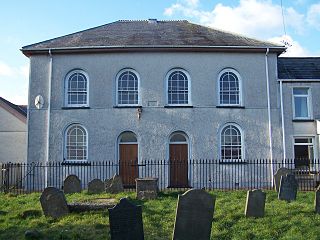
Aberdare is a town in the Cynon Valley area of Rhondda Cynon Taf, Wales, at the confluence of the Rivers Dare (Dâr) and Cynon. Aberdare has a population of 39,550. Aberdare is 4 miles (6 km) south-west of Merthyr Tydfil, 20 miles (32 km) north-west of Cardiff and 22 miles (35 km) east-north-east of Swansea. During the 19th century it became a thriving industrial settlement, which was also notable for the vitality of its cultural life and as an important publishing centre.

Trecynon is a village near Aberdare situated in the Cynon Valley, in Rhondda Cynon Taf, Wales. It dates from the early nineteenth century and developed as a result of the opening of the Aberdare Ironworks at Llwydcoed in 1800.

Calfaria Baptist Chapel, Aberdare, was one of the largest baptist churches in the South Wales Valleys and the oldest in the Aberdare valley. The chapel had an ornate interior, including a boarded ceiling with a deeply undercut rose, while the balcony balustrading had a cast iron front with an intricate foliage design. These features were common in the Welsh chapels of the late nineteenth century. The organ was installed in 1903 at a cost of £850. It was played for the last time in 2012 by Robert Nicholls, during a Radio Cymru broadcast shortly before the closure of the chapel.

Siloa, Aberdare was the largest of the Welsh Independent, or Congregationalist, chapels in Aberdare. Services are held in the Welsh language. Established in 1844, Siloa is one of the few Welsh language chapels in the locality to remain open today. Siloa was notable for its long-serving ministers and in over a century there were only three pastorates, namely those of David Price (1843–78), D. Silyn Evans (1880–1930) and R. Ifor Parry (1933–64).
Heolyfelin Chapel, Trecynon, Aberdare was a Welsh Baptist chapel established in 1855. Services were held in the Welsh language. The building seated 800. By December 2015 the chapel had closed and was for sale.
Gwawr, Aberaman was a Baptist chapel in Regent Street, Aberaman, near Aberdare, South Wales, formed as a branch of Calfaria, Aberdare
Seion, Cwmaman is a Welsh Baptist church, originally established in 1859. The chapel closed in 2013 but the church still meets at another location in the village.
The community of Aberaman, Rhondda Cynon Taf was an electoral ward for much of the twentieth century, for the purposes of electing members to Glamorgan County Council and the Aberdare Urban District Council. It currently comprises two electoral wards, Aberaman North and Aberaman South, for the purposes of electing members to the Rhondda Cynon Taf County Borough Council. Aberaman North is composed mainly of Aberaman itself while Aberaman South includes Abercwmboi, Cwmaman, Godreaman and Glynhafod.
Ynyslwyd Chapel, Aberdare was a Baptist chapel in Sunny Bank Place, located between Aberaman and Aberdare. It was formed as a branch of Calfaria, Aberdare.

Ebenezer, Trecynon was an Independent (Congregationalist) chapel in Ebenezer Street, Trecynon, Aberdare, Wales. It was one of the earliest Independent chapels in the Cynon Valley and remained an active place of worship until 2009.
Horeb, Llwydcoed is an Independent (Congregationalist) chapel in Llwydcoed, Aberdare, Wales.

Nebo, Hirwaun was an Independent (Congregationalist) chapel in Merthyr Road, Hirwaun, Aberdare, Wales.

Elim, Cwmdare was an Independent (Congregationalist) chapel in Cwmdare, Aberdare, Wales.

Salem, Robertstown is an Independent (Congregationalist) chapel in Bridge Street, Robertstown, Aberdare, Wales.
Moriah Aman, Cwmaman was a Welsh Independent (Congregationalist) chapel in Fforchaman Road, Cwmaman, Rhondda Cynon Taf, Wales.
Soar, Cwmaman was a Welsh Calvinistic Methodist chapel in Fforchaman Road, Cwmaman, Rhondda Cynon Taf, Wales.
Tabernacle, Aberdare was a Congregationalist chapel in Station Street, Aberdare, Wales. Services at Tabernacle were held in the English language.

Bethesda, Abercwmboi is a Welsh Baptist church in Abercwmboi near Aberdare. Services continue to be held in the Welsh language.

Hen-Dy-Cwrdd is a disused Unitarian chapel in Trecynon, Aberdare, Wales. Services at the chapel were conducted in the Welsh language.
Bethesda, Merthyr Tydfil was one of the earliest chapels in the Welsh industrial town of Merthyr Tydfil. Services were held in the Welsh language.











